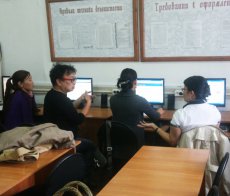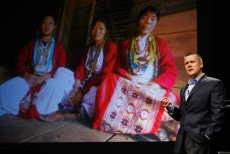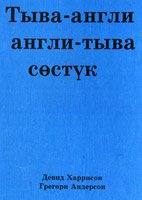 A team of 10 teachers of Tuvan and English has finished the first stage of their work at forming Tuvan-English automatic translator, a part of a large-scale Internet project run by K David Harrison, an associate professor of linguistics at Swarthmore College and a National Geographic Fellow. David Harrison is a connoisseur of Tuvan and its active promoter. The Tuvan part of work would be finished within a year, linguists believe. Earlier this year BBC reported that Facebook, YouTube and even texting will be the salvation of many of the world's endangered languages, scientists believe. A team of 10 teachers of Tuvan and English has finished the first stage of their work at forming Tuvan-English automatic translator, a part of a large-scale Internet project run by K David Harrison, an associate professor of linguistics at Swarthmore College and a National Geographic Fellow. David Harrison is a connoisseur of Tuvan and its active promoter. The Tuvan part of work would be finished within a year, linguists believe. Earlier this year BBC reported that Facebook, YouTube and even texting will be the salvation of many of the world's endangered languages, scientists believe.
Of the 7,000 or so languages spoken on Earth today, about half are expected to be extinct by the century's end.
Globalisation is usually blamed, but some elements of the "modern world", especially digital technology, are pushing back against the tide.
North American tribes use social media to re-engage their young, for example.
Tuvan, an indigenous tongue spoken by nomadic peoples in Siberia and Mongolia, even has an iPhone app to teach the pronunciation of words to  new students. new students.
"Small languages are using social media, YouTube, text messaging and various technologies to expand their voice and expand their presence," said K David Harrison, an associate professor of linguistics at Swarthmore College and a National Geographic Fellow.
"It's what I like to call the flipside of globalisation. We hear a lot about how globalisation exerts negative pressures on small cultures to assimilate. But a positive effect of globalisation is that you can have a language that is spoken by only five or 50 people in one remote location, and now through digital technology that language can achieve a global voice and a global audience."
Harrison, who travels the world to seek out the last speakers of vanishing languages, has been describing his work here at the annual meeting of the American Association for the Advancement of Science (AAAS).
 With National Geographic, he has just helped produce eight talking dictionaries. With National Geographic, he has just helped produce eight talking dictionaries.
These dictionaries contain more than 32,000 word entries in eight endangered languages. All the audio recordings have been made by native speakers, some of whom like Alfred "Bud" Lane are among the last fluent individuals in their native tongues.
Mr Lane speaks a language known as Siletz Dee-ni, which is restricted to a small area on the central Oregon coast.
"Linguists came in and labelled our language moribund, meaning it was heading for the ash heap of history; and our tribal people and our council decided that wasn't going to happen. So we devised a plan to go forward to start teaching our dialect here in the Siletz Valley," he told the meeting.
Mr Lane has sat down and recorded 14,000 words for the online dictionary. "Nothing takes the place of speakers speaking to other speakers, but this bridges a gap that was just sorely needed in our community and our tribe."
Margaret Noori is an expert in Native American studies at the University of Michigan and a speaker of Anishinaabemowin, which is the sovereign language of over 200 indigenous "nations" in Canada and the US. These communities are heavy users of Facebook.
"What we do with technology is try to connect people," Prof Noori said. "All of it is to keep the language."
Dr Harrison says not all languages can survive, and many inevitably will be lost as remaining speakers die off. But he says the new digital tools do offer a way back from the brink for a lot of languages that seemed doomed just a few years ago.
He told BBC News: "Everything that people know about the planet, about plants, animals, about how to live sustainably, the polar ice caps, the different ecosystems that humans have survived in - all this knowledge is encoded in human cultures and languages, whereas only a tiny fraction of it is encoded in the scientific literature.
"If we care about sustainability and survival on the planet, we all benefit from having this knowledge base persevered."
|
